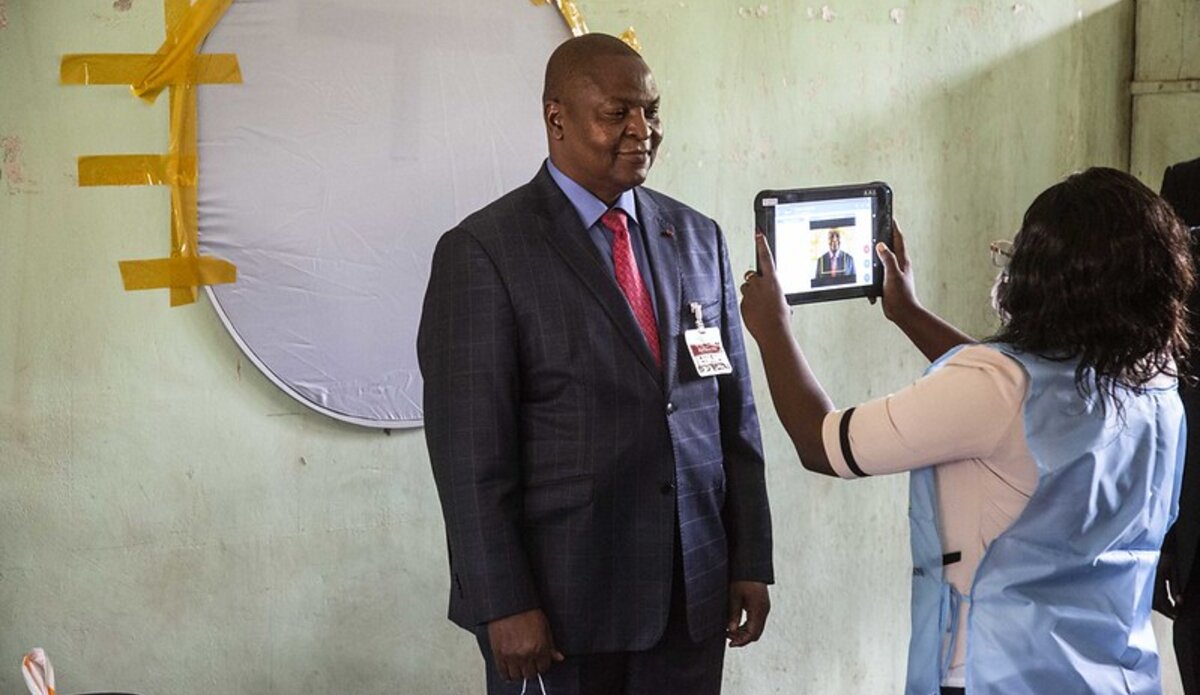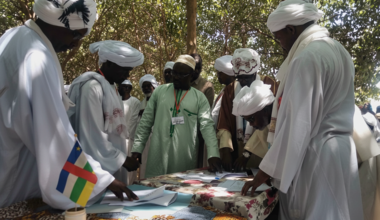CAR 2020-2021 elections – voter registration kicks off
With the December 2020 presidential elections less than six months away, preparations for the 2020/2021 election cycle in the Central African Republic (CAR) are now underway. Voter registration commenced on Tuesday, 30 June 2020 at the Lycée Barthelemy Boganda in Bangui.
First in line was the Head of State Professor Faustin Archange Touadéra. Electoral officials verified his civil status and took his photograph, thereby marking the official launch of the voter registration process countrywide – in the presence of the President of National Elections Authority (ANE) Marie-Madeleine Nkouet, the Special Representative of the UN Secretary General in CAR Mankeur Ndiaye and his Deputy and Resident Coordinator Denise Brown, as well as the Resident Representative of the United Nations Development Programme Natalie Boucly and other international partners.
Over recent months, election materials including 4,400 digital tablets for the enrolment of voters and equipment comprising of voter registration forms, polling booths, solar panels and batteries, as well as energy banks and other electoral kits have been handed over to the ANE and transported to various regions across CAR, with the support of MINUSCA.
The organization of the next election cycle comes at a time of marked security and public health challenges. At least a dozen armed groups continue to wage war in various parts of the country; the coronavirus disease (Covid-19) is similarly showing no signs of abating. The pandemic loomed large over the voter registration opening ceremony – the ANE received the Head of State under strict adherence to preventive measures.
Exercising the right to vote was the overriding message as voter registration was kicked off. President Touadéra urged his fellow citizens to take this civic duty seriously and turn out in great numbers: “I invite all our compatriots to register to vote. It is their constitutional right to choose their leaders. ... because without this form of governance, we will always fall into violence and barbarism, which, as we have seen, have set us back a few years.”
MINUSCA provides security, technical and logistical support
UN Security Council Resolution (UNSCR) 2499 mandates MINUSCA “to assist the CAR authorities in the preparation and delivery of peaceful presidential, legislative and local elections of 2020/2021” through logistical, security and technical support. The résolution highlights the primary responsibility of the CAR authorities to organize inclusive, free, fair and peaceful elections as per constitutional timelines. The last general elections were held in 2015/2016.
“We advocate not only for the participation of Internally Displaced Persons (IDPs) but also for refugees,” said MINUSCA Chief Mankeur Ndiaye. He also called for the massive participation of women, both as voters and candidates, whilst recognizing the challenges hindering many vulnerable groups from engaging in political processes.
Mass media has played a crucial role in MINUSCA’s efforts to raise awareness on the voter registration process in the face of limitations to mass gatherings due to Covid-19. Emphasis has been put on reaching young people and women. Sketches on the importance of a democratic culture that is open to all citizens have been produced, as have informative flyers and posters. Billboards have been erected to encourage women to take part in the electoral process; local musicians have been commissioned to produce songs for the same cause. The MINUSCA radio station, Guira FM, started a daily educational magazine on how to register for the upcoming elections, with information on required documentation and locations for registration centers provided in the local Sango language and French.
As indicated in the 16 June 2020 Secretary-General’s Report on CAR, the electoral mapping process resulted in the designation of 3,500 voter registration centers. They will also serve as polling stations. To address potential threats to the timely holding of elections, an integrated security plan that will require the joint efforts of the national security forces and MINUSCA peacekeepers has been developed and the impact of Covid-19 on elections preparation is being continually evaluated.
Voter registration is set to end on 28 July 2020.
 UN
UN United Nations Peacekeeping
United Nations Peacekeeping





